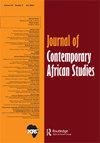非洲中产阶级,政治和抗议:关于这个问题的背景
IF 0.8
Q2 AREA STUDIES
引用次数: 0
摘要
全球南方的中产阶级已经成为热门话题。它们主要是由面向发展机构的经济学家考虑的,并被称赞为促进经济发展和民主力量的一个因素。我们总结了其中的一些趋势,并提醒读者注意早期的争论。我们盘点了各种各样的贡献,并指出了对“中产阶级”的组成和取向以及他们的政治参与进行更细致入微的观察的努力。我们认为,最初的经济削减,衡量货币收入作为中产阶级的主要标准,是不够的,并且没有提供一套可靠的指标来衡量这些收入群体成员的社会、政治和文化定位。对非洲中产阶级的性质和作用的适当分析必须考虑四个方面:非洲社会的具体阶级构成;社会经济分层与社会政治取向之间的联系;非洲社会有限的知识和理论;需要运用多维度和新的研究,包括不同的社会文化因素及其语境嵌入性。我们认为,一个交叉的镜头可以打破一维范式的经典竞争,并建议通过整合来自非洲的视角和理论,对抗议和中产阶级进行非殖民化研究。应更多地注意诸如交叉性和社会环境等分析概念,以便了解非洲社会及其通过抗议进行变革的潜力。这需要克服对中产阶级的刻板印象和被截断的假设。本文章由计算机程序翻译,如有差异,请以英文原文为准。
African middle classness, politics and protest: on the context of this issue
ABSTRACT Middle classes in the Global South have become topical. They were considered mainly by economists in development-oriented institutions and praised as a factor contributing to economic development and democratic forces. We recapitulate some of the trends and remind the reader of earlier debates. We take stock of the variety of contributions and point to the efforts to have a more nuanced look at the composition and orientations of ‘middle classes’ and their political engagements. We maintain that the initial economistic reduction, measuring monetary income as the main criteria for middle classness, is insufficient and offers no reliable set of indicators as to the social and political as well as cultural positioning of members of such income groups. An appropriate analysis of the nature and role of African middle classes must consider four aspects: the specific class formations of African societies; the link between socioeconomic stratification and sociopolitical orientations; the limited knowledge and theorisation of African societies; and the need to apply a multidimensional and new research including diverse sociocultural elements and their contextual embeddedness. We argue that an intersectional lens can break up the classical competition of the one-dimensional paradigms and suggest decolonising research on protest and middle classes by integrating a perspective and theorisation from Africa. More attention should be paid to analytical concepts such as intersectionality and social milieu for the understanding of African societies and their potential for transformation through protest. This requires overcoming stereotypical and truncated assumptions about the middle classes.
求助全文
通过发布文献求助,成功后即可免费获取论文全文。
去求助
来源期刊

Journal of Contemporary African Studies
AREA STUDIES-
CiteScore
2.20
自引率
0.00%
发文量
18
期刊介绍:
Journal of Contemporary African Studies (JCAS) is an interdisciplinary journal seeking to promote an African-centred scholarly understanding of societies on the continent and their location within the global political economy. Its scope extends across a wide range of social science and humanities disciplines with topics covered including, but not limited to, culture, development, education, environmental questions, gender, government, labour, land, leadership, political economy politics, social movements, sociology of knowledge and welfare. JCAS welcomes contributions reviewing general trends in the academic literature with a specific focus on debates and developments in Africa as part of a broader aim of contributing towards the development of viable communities of African scholarship. The journal publishes original research articles, book reviews, notes from the field, debates, research reports and occasional review essays. It also publishes special issues and welcomes proposals for new topics. JCAS is published four times a year, in January, April, July and October.
 求助内容:
求助内容: 应助结果提醒方式:
应助结果提醒方式:


